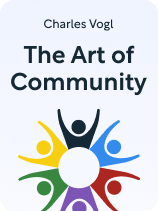

This article is an excerpt from the Shortform book guide to "The Art of Community" by Charles Vogl. Shortform has the world's best summaries and analyses of books you should be reading.
Like this article? Sign up for a free trial here.
Is social stratification necessarily a bad thing? How can social stratification cause inequality?
As communities grow, stratification (a division between more experienced and less experienced members) will naturally occur. Charles Vogl explains that stratification is a good thing, as it gives members something to aspire to.
Discover why social stratification and inequality don’t always mean the same thing.
Stratification Can Be a Good Thing
Vogl says that social stratification can show that there’s a potential for developing their skills and moral sensibilities and becoming better versions of themselves. However, negative social stratification and inequality can occur when members feel compelled to continually climb to higher and higher ranks because they desire prestige. This is unhealthy because when you’re always aiming to achieve something more, you’re never satisfied with what you have now.
(Shortform note: There may be another factor driving you to climb to higher community ranks—perfectionism. Some forms of perfectionism can drive you to pursue unrealistic goals (like becoming the best of the best within your community) because you fear that if you don’t achieve those goals, you’ll lose others’ respect. According to psychologists, perfectionism can exacerbate self-esteem issues and even lead to an early death. To tame your perfectionism, experts recommend noting the ways it’s hurting you, setting more realistic goals, and creating healthy limits that help you know when enough’s enough. For example, you might volunteer to spearhead just one community project rather than putting your hand up for all of them.)
To remedy this pitfall, Vogl recommends that you prioritize building relationships over seeking status. Recall that the fundamental purpose of a community is to bring people together so they can support each other’s growth. If you keep that goal in mind, you’ll be more satisfied with simply being part of your community and less likely to pursue endless advancement. To help you focus on this priority, Vogl recommends participating in community activities that you enjoy often—this will enhance your connections with other members and bring you a natural sense of fulfillment.
(Shortform note: Vogl recommends prioritizing community relationships because it’s more fulfilling than status-seeking—and according to an 80-year longitudinal study conducted by Harvard University, he’s right. This study found that the happiest people are those that prioritized their relationships over other facets of well-being (including the accrual of achievements and status). Importantly, prioritizing your relationships means putting in the effort needed to maintain them—this might require regular reflection on the status of your relationships and a willingness to connect with members of your community, even when you don’t feel like it.)
How to Help Community Members Advance
Although you should prioritize relationships over status, Vogl says it’s natural to want to continue growing as a person and advancing within a community. He makes a few recommendations that can help community members make healthy progress. Note that these principles apply to both offline and online communities.
First, develop a healthier definition of success within your community. This involves recognizing several different levels of success within the community—lower, higher, and highest levels—and bestowing members with progressively greater privileges as they graduate from one level to the next. That way, you don’t have to be the best of the best for your growth to be honored. Vogl also explains that not everyone can or should reach the highest levels of a community—every level is equally important because everyone within the community brings something unique and valuable to the table. Once you find a level that’s comfortable, it’s okay to stay there; you don’t have to keep advancing just for the sake of achievement.
Second, clarify advancement criteria. Vogl says that the best goal a community can have is to expand members’ capacity for care. The newest members of a community might be concerned primarily with developing their own skills and character, but more experienced members concern themselves with helping newer members grow—and members of the highest levels of the community are concerned with promoting the wellbeing of everyone in the world. The more caring you become, the higher the level you can reach. Other qualifications for advancement—like mastery of certain skills—should also be made clear, and members’ qualifications should be appraised before they’re allowed to formally advance.
Third, Vogl says you should establish an infrastructure that can support growth. This means giving all interested members access to more experienced members who can teach them what they need to know if they’re going to advance to higher levels. Teaching can be formal (like a skills class) or informal (like experienced members sharing wisdom with newer members when they hang out). Vogl explains that this infrastructure should be easy to access—the purpose of a community is to support members’ growth, so if newer members feel that they can’t or don’t know how to learn from more experienced members, they’ll lose interest. Vogl adds that teaching supports the growth of more experienced members, too, because they’ll learn from their mentees.
The Role of Higher-Level Community Members
Vogl explains that because they’ve made more progress within the community, higher-level community members have greater power in three domains: They have the right to include or exclude members from the community based on their behavior, they preside over community customs, and they educate less experienced members about the community’s moral code.
(Shortform note: Beyond these three powers, some experts argue that higher-level community members have other special capabilities, too. For example, in Dare to Lead, Brené Brown argues that leaders are uniquely responsible for promoting vulnerability within their communities, strengthening connections between community members, and inoculating their communities against failure.)
The role that higher-level members play is important—without their oversight, lower-level community members might disregard the moral code, repeat community management mistakes, and consequently lose faith in the community’s value or ability to function. Higher-level members might take what less experienced members say under consideration, but higher-level members’ opinions are generally more respected.
(Shortform note: One reason that higher-level community members’ opinions are more respected is that they have more experience inside the community, which lends them greater credibility. In Principles: Life and Work, Ray Dalio argues that when communities give heavier weight to the opinions of more credible people, this leads to better group decision-making.)
However, Vogl also says that the greater authority higher-level members enjoy must be earned, and it can be easily lost if other members don’t feel they’re doing a good job. He says higher-level members often fail when their egos get in the way and they disallow any debate about community ideals. To safeguard against this, higher-level members should listen to others who disagree with the status quo and be open to making changes. When disagreements can’t be resolved, it’s best for higher-level members to exclude dissenting members who insist on a new moral code—they can then form their own community.
(Shortform note: In Servant Leadership, Robert K. Greenleaf makes a similar argument about leaders of formal institutions that can be adopted for high-ranking members of any community. He says that leaders can only earn authority and respect by proving that their way of doing things actually benefits the people they serve (in this case, lower-ranking members of the community) and embodying five other qualities (self-responsibility, intuition, perseverance, good communication, and a nurturing spirit). To safeguard against abuses of authority, he recommends moderating the power that high-ranking members of an institution can exercise (for example, by distributing power equally among several leaders).)

———End of Preview———
Like what you just read? Read the rest of the world's best book summary and analysis of Charles Vogl's "The Art of Community" at Shortform.
Here's what you'll find in our full The Art of Community summary:
- The fundamental guidelines all communities should follow
- How to institute a community meeting place and set of customs
- How you can enhance belonging within your community






